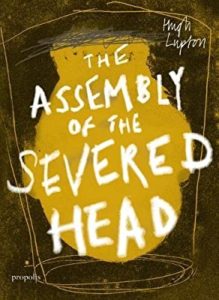

 There I was at the reference desk, lo many years before I left library work to teach college English. Along with many other reference guides to ancient lore and legend, on the reference shelves behind my desk, sat a copy of The Mabinogian, the seminal collection of legends of the Cymreig (Welsh) Celts.
There I was at the reference desk, lo many years before I left library work to teach college English. Along with many other reference guides to ancient lore and legend, on the reference shelves behind my desk, sat a copy of The Mabinogian, the seminal collection of legends of the Cymreig (Welsh) Celts.
Oh, as a Wiccan, I knew I should read it. And yet I’d tried from time to time, and it bored me to tears. Those unpronounceable names! Those interminably long-winded stories! Then along came The Assembly of the Severed Head, and it seemed as if someone had intuited that the collection of Cymreig folk tales that show such insight into early Celtic culture and beliefs might need a bit of help in getting the modern reader interested.
And interest the reader it does! Lupton has done a brilliant job of creating characters that help us warm to the stories, and ushers the reader into a time and a place that seems fresh and real rather than the musty remains of an unknowable past. The story begins with Dafydd, a lay brother in a Welsh monastery, going about his daily-prescribed chores. When he comes to the seashore—usually a pleasant part of his otherwise dutiful day—he comes across a hideous sight—a severed head in the surf. Thus begins the story of the novel. The tonsure of the severed head leads Dafydd and the Cistercian brothers to believe that the dead man was a bard, and over the next few days more bardic heads and body parts wash up. Soon it is learned that Flemish mercenaries working for the English King John have slaughtered the bards, and only one is left alive: a badly injured old man named Cian Brydydd Mawr.
Cian Brydydd Mawr is the greatest of the bards, it appears, in our story. He is most likely based on Cynddelw Brydydd Mawr (fl. 1155-1200), who, according to David Myrddin Lloyd (1959) was “the leading 12th century Welsh (sic) court poet.”
The Bardic Schools of Cymru (Wales) that Lupton speaks of in the novel are an iffy proposition in the 13th century, apparently, if indeed they did exist that late into the modern age. They did indeed exist in Eire (Ireland) according to “The Fascinating History of the Irish Bardic Poets” (2020) at that time. There has always been some doubt about the stories in the Mabinogian insofar as whether they represent pagan beliefs, since they do hail from pre-Christian times. The stories of the Mabinogi are written down in the Christian era, and although the characters within them no doubt come from traditional tales of Celtic heroes, whether any of the actual pagan religion of the Druids and their fellow travelers remains in these stories is very much up for debate.
This discomfort between the old stories and how the new religion sees such things is not glossed over in the novel; it is in the words of the sub-prior of the Order in the tale that “It is a crusade we are fighting, Brother. The light must defeat the ancient darkness of our forefathers” (32). We are to assume that the “light” is the Christian religion and the “ancient darkness” refers to pre-Christian beliefs. Yet the tales that Cian Brydydd Mawr has to tell are ultimately deemed worthy to set down on parchment; one can easily imagine that something similar happened in the recording of Beowulf, although in that tale the discomfort between pagan and Christian is far more palpable, and so far as we know there was no old Skald left alive to dictate, whether fictional or not. Nevertheless, Lupton does a good job of making it believable that a Christian monk would write down these tales of the pre-Christian Cymreig people.
We get a good overall sense of the lives of the people in the 13th century: the Cymreig fight with the British; everyone has issues with the Norman French, and then there is the truth of the sheer dogged drudgery of eking out a living in what seems to our modern age to be a cold and primitive place. In any case, as our story progresses, the great bard is brought to the monastery to recover, if recover he can. It becomes a race against time to see whether the monks can set to page his stories, before his deeply wounded body and the frailty of age make his storytelling no longer possible.
And so we learn of heroes and giants, kings and queens, magical beings who may be gods and goddesses, or at least deified mythological heroes and heroines. And what do the Cistercian brothers think of these tales?
Well, Cian Brydydd Mawr finishes another of his Mabinogi stories, and he asks the monk Brother Iago what he thinks of it:
Brother Iago looked at the ground. There was a pale smile on his lips. “I owe that episode in your strange and profane story a debt of gratitude.”
“It brought into my thoughts a book that we have in the library at Aberconwy…. “It contains the writings of Dionysius the Areopagite. He writes, the mysteries of God’s words lie simply, absolute and unchangeable in the brilliant darkness of hidden silence. Amid the deepest shadow they pour overwhelming light on what is most manifest. Amid the unsensed and unseen they fill our sightless minds with treasures beyond all beauty.” (210).
Although the stories incorporated into The Assembly of the Severed Head from the four branches of the Mabinogi are clearly fictional and fall under the heading of “the oral tradition,” one does wonder just what we can glean from them to help us in our own understanding of the pre-Christian Celtic beliefs, especially when we come across examples like the following, in which Cian Bryddyd Mawr says,
“My story concerns the one who is called Mabon, son of Modron, the “Son of the Great Mother.”
Dafydd said: “There are those who call Christ Jesu “Mabon.”
“There are.” (286).
In “The Four Branches of the Mabinogi” Will Parker (2010) states that “The rather mysterious term Mabinogi itself has been interpreted by Professor Eric Hamp as deriving from the Common Celtic *Maponaki “(the deeds of) the family of the god Maponus.” The boy god Maponus (known as Mabon in Medieval Welsh (sic) literature) seems to have been a popular Gallo-Brittonic deity, who was sometimes equated with the Roman Apollo…”And so the mystery abounds. In any case, whether or not this telling of the Mabinogi tales sheds any more light on the beliefs of the pre-Christian Celts or allows us to see just how much those beliefs have merged with Celtic Christianity, it is still a masterful retelling of the tales in a context that is entertaining and highly imaginable. It gets my highest recommendation.
Hugh Lupton is also the author of The Ballad of John Clare (2010), and as Clare is one of my favorite British poets, I look forward to reading it. Lupton is a professional storyteller, lyricist, and performer, and the award-winning author of the children’s collection Tales of Wisdom and Wonder (2008). I found a link to a song that makes my dark little Gaulish heart glad, on one site about Lupton; he has written the lyrics to a song about Mari Lywd, the curious horse-headed creature that comes a-wassailing in parts of Cymru (Wales) and who, not unlike Krampus, is becoming a popular figure at Christmas in the United States. It is thought that Mari Lywd may have a connection to the Gaulish horse goddess, Epona. I hope so. Just as the Cymru are Celts, we forget that the Gauls were too. Well, I haven’t forgotten, but that’s another story for another time.
The Assembly of the Severed Head and other books by Hugh Lupton are available at Amazon.com, Barnes & Noble, and other fine booksellers.
References
“The Fascinating History of the Irish Bardic Poets.” (2020). The Genuinely Irish Old Moore’s Almanac, https://oldmooresalmanac.com/the-history-of-the-irish-bardic-poets/.
Lloyd, David Myrddin.(1959) “Cynddelw Brydydd Mawr.” Y Bywgraffiadur Cymreig/Dictionary of Welsh Biography, Llyfrgell Genedlaettiol Cymru/The National Library of Wales, https://biography.wales/article/s-CYND-BRY-1155?&query=mawr&searchType=nameSearch&lang[]=en&sort=sort_name&order=asc&rows=12&page=1
Lupton, Hugh. (2018)The Assembly of the Severed Head: A Novel of the Mabinogi. Propolis.
(2010) The Ballad of John Clare. The Dedalus Press.
(2008) Tales of Wisdom and Wonder. Barefoot Books.
“Mari Lywd,”(2013) lyrics by Hugh Lupton, music and performance by Chris Wood, https://www.youtube.com/watch?time_continue=33&v=vc_OXXt9PeE&feature=emb_logo
Parker, Will. (2010) “The Four Branches,” The Mabinogian. http://www.mabinogion.info/four-branches.htm.
“Rambles with the Mari Lywd,” (2012 Dec. 12) Go Deeper. http://www.godeeper.info/blog/rambles-with-the-mari-lwyd.
Bio